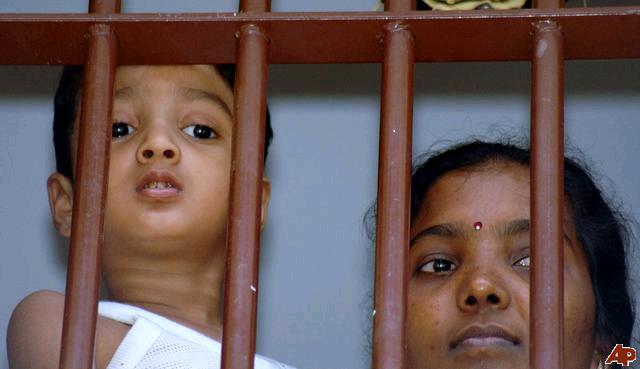
Why detention is no place for a child
As of 14th October 2010 there are 723 children in detention in Australia. These children range in age from newborn to 18 years of age, including three babies who were born in detention. Children are some of the most vulnerable people in our community. How we treat children shapes their future, impacts what sort of adults they will be, affects what contribution they will make to society and influences how our society will function for years to come.
At its most basic, how we treat children reflects our humanity. Do we want to be reflected as a country that locks up children and a country where babies are born without freedom? Is this how we want to portray ourselves to the world?
Since 2005 children are no longer held in detention ‘centres’ but they are still detained in seven alternative locations. This is a routine part of mandatory detention. Australia’s immigration policy makes the detention of these children the first and ONLY option and it puts no limit on the time that they are held there. Children wait in detention for months or years.
More than 92% of all children arriving by boat since 1999 have been recognised by Australian authorities to be genuine refugees. In the case of Iraqi children the figures are as high as 98%.
There are humane alternatives available in the community for the care and support of asylum seeker children.
Australia’s policy of placing children in detention is illegal, inhuman and damages children.
Legally
By placing children in detention, Australia is breaching the international Convention on the Rights of the Child’.
Child refugee protection is covered by the UN human rights treaty, the 1989 Convention on the Rights of the Child (CROC). This convention has been ratified by almost every country in the world (including Australia on 17 December 1990) and it outlines civil, political, economic, social and cultural human rights and obligations for those countries.
A child’s right to protection, education, recreation, medical care and humanitarian consideration are also covered in this convention.
Article 37 of the Convention states that holding children in detention shall be used as a measure of last resort and only for the shortest possible time.
Humanitarian
Roughly half of the world’s 43 million asylum seekers and refugees are children. Australia has committed to being a refuge for people fleeing danger, it has committed to the UN convention on rights of the child and it holds itself as a regional and world leader of social welfare. WHY then are these 723 children not afforded the right to be free to be children, to go to school, to learn to ride a bicycle or to play in the park?
Mental health
Australian of the year Prof Patrick McGorry has called detention facilities “factories for mental illness”. He believes that detainees often suffer anxiety, depression, trauma symptoms and behavioural withdrawal. Children are unable to have normal developmental experiences when in detention. They themselves suffer from anxiety and are also impacted by their parents’ anxiety and depression and situations around them. Additionally, we know that detention compounds the effect of previous trauma and exacerbates the grief and loss that these children have already suffered whether they are accompanied or unaccompanied in their flight to Australia.
Professor Louise Newman, child psychiatrist, is the head of the Australian Government’s health advisory panel on immigration detention. She says the motels, lodges and other facilities currently being used to house children are not designed for young people. There are cases where some of the already very stressed and vulnerable young people in some of these situations are self-harming, becoming distressed and agitated.
Long term impact
Sadly Australia will suffer the consequences of keeping these children in detention and preventing them having a relatively normal childhood. More than 95% of children in detention will be accepted as refugees. The burden of post-traumatic stress and other ongoing mental health disorders as well as difficulty integrating into society after experiencing prolonged detention and trauma will be felt for years by Australia. We should be caring for these children in the community and ensuring the experiences they have fled are dealt with and that they are cared for in a way to facilitate their future in Australia.
What kind of Australia do we want? What sort of legacy do we want to leave behind?
Leave a reply

Connect with us
Need help from the ASRC? Call 03 9326 6066 or visit us: Mon-Tue-Thur-Fri 10am -4pm. Closed on Wednesdays.